#takuma saio
Explore tagged Tumblr posts
Text

57 notes
·
View notes
Text

Duel Links: Saoi Full Victory Sprite
9 notes
·
View notes
Text

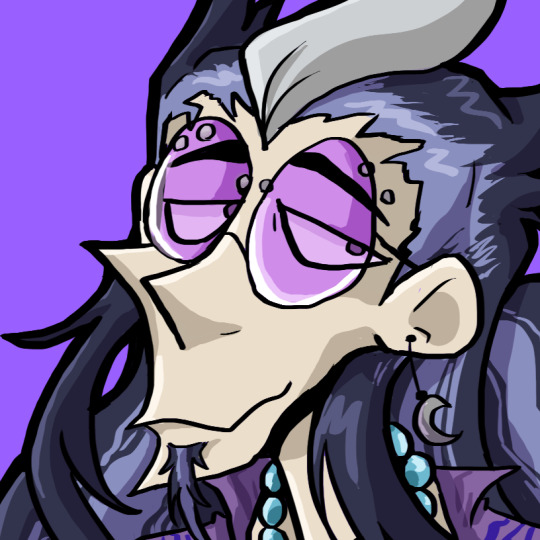

College AU Sartorius moment(s)!!!!!
#yugioh gx#sartorius kumar#takuma saiou#takuma saio#aster phoenix#edo phoenix#ygoart#dana art#ygo spinoff college au#one of my fav guys in the whole AU....they got a lot going on
63 notes
·
View notes
Text
yugioh gx 104
I think I finished this arc

what





nice i always love stuff like this









lmao everyone bullies him when it comes to being a person







MANJOUME THUNDER

RIP everyone not in this shot except manjoume.
#yugioh gx#yugioh#orangesmario experiences media#judai yuki#light of destruction#tyranno kenzan#elemental hero neos#jun manjoume#rei saotome#samejima#cronos de medici#Napoleon#takuma saio
2 notes
·
View notes
Text
Today's LGBT+ Headcanon is;

Sartorius|Takuma Saio from Yu-Gi-Oh GX-Transmasculine Nonbinary and Gay
Species: Human
Requested by @too-odd-for-ordinary
Status; Alive
#Sartorius#Takuma Saio#Yu-Gi-Oh GX#transmasculine#nonbinary#gay#lgbt headcanon#character of the day#nblm#lgbt#headcanons#anime#yu gi oh gx#requested#fandoms i'm not in#keuw#pride month#pride 2024#alive
4 notes
·
View notes
Text
ROUND 1D, MATCH 2 OUT OF 8!


Monster Stats & Propaganda Under the Cut:
Vennominaga the Deity of Poisonous Snakes is used by Cobra (Thelonious Viper in the English dub). Its stats are the following:
Attribute: DARK
Level: 10
Type: REPTILE / EFFECT
Effect Type: SUMMONING CONDITION / CONTINUOUS / TRIGGER / CONDITION
Effect (according to the anime): “This card cannot be Normal Summoned or Set. This card cannot be Special Summoned except with "Rise of the Sacred Deity". This card gains 500 ATK for each Reptile-Type monster in your Graveyard, and cannot be targeted or affected by the effects of other monsters, Spells, and Traps. When this card is destroyed by battle and sent to the Graveyard, you can remove from play 1 other Reptile-Type monster from your Graveyard to Special Summon this card. Any player that takes Battle Damage from a battle involving this card loses the Duel during the Standby Phase of your opponent's 3rd turn after taking the damage.”
ATK / DEF: 0 / 0
Propaganda:
Always love seeing janky alternate win conditions. Is it good? No. But it's fun seeing everyone pretend it is.
Arcana Force XXI – The World is used by Takuma Saio (Sartorius in the English dub). Its stats are the following:
Attribute: LIGHT
Level: 8
Type: FAIRY / EFFECT
Effect Type: TRIGGER
Effect (according to the anime): “When this card is Summoned, toss a coin. If Heads, this card gains the Right Side Up effect. If Tails, this card gains the Upside Down effect.
● Right Side Up: During your End Phase, you can send 2 monsters you control to the Graveyard to skip your opponent's next turn.
● Upside Down: During your opponent's Draw Phase, they can add the top card of their Graveyard to their hand.”
ATK / DEF: 3100 / 3100
Propaganda:
The World is the most powerful of the Arcana it cannot be bested. It controls the flow of time itself and allows you to just skip the opponent's turn. ""The World's true power, as its name suggests, is to reign supreme over the entire world!"" Saio even shares a voice actor with DIO so you know The World is legit, it's so strong Arcana Force will never good support out of fear for The World Lock becoming too viable.
Let it be known that Dio's Japanese VA (Takehito Koyasu) voiced a guy whose ace monster is ""The World"". ZA WARUDO!
#vennominaga the deity of poisonous snakes#arcane force xxi - the world#sartorius#takuma saio#cobra#thelonious viper#yu-gi-oh#yugioh#yu-gi-oh gx#yugioh gx#gx#poll bracket#poll tournament#polls#round 1#round 1d#yugipoll
3 notes
·
View notes
Text


Quick edit because season 4 changing Saio's sclera color drives me fucking crazy.
#yugioh gx#Takuma Saio#the white sclera feel so wrong#like who are you and what have you done with Saio
0 notes
Text



They are in ✨love✨
#yugioh#ygo#yugioh gx#ygo gx#yu gi oh#Aster phoenix#Edo phoenix#Satorius kumar#Saio takuma#joey wheeler#jounouchi katsuya#destinyshipping#They are gay
61 notes
·
View notes
Text
Saio is a good villain from a much better show but dang it, Ruri is one of my nonsensical faves that I can't help but vote for her.
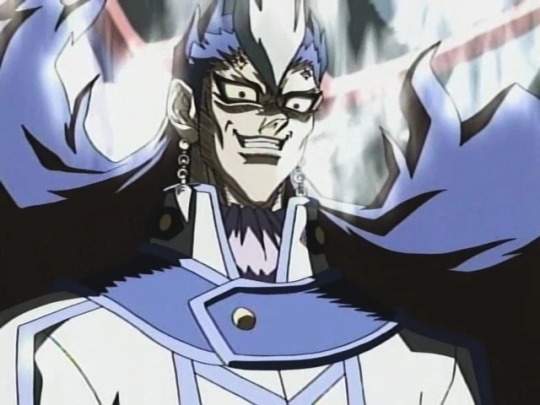
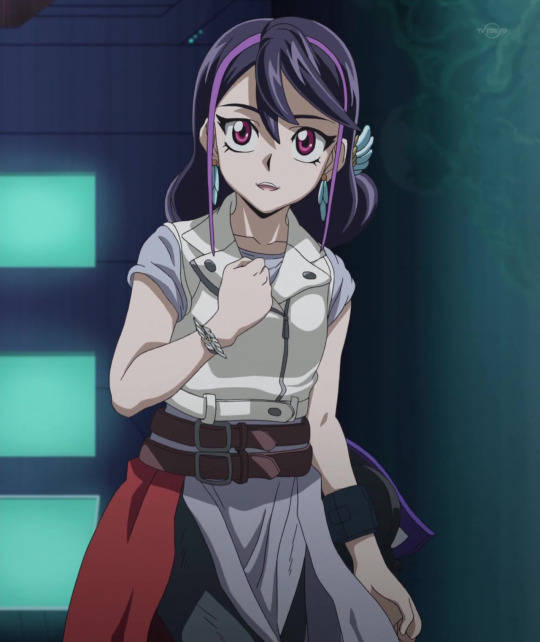
ROUND 1 MATCH 6 SAIOU TAKUMA/SARTORIUS INSANE LEADER OF THE SOCIETY OF LIGHT VS RURI KUROSAKI/LULU OBSIDIAN #1 BIRD XYZ USER IN ALL OF HEARTLAND
#reblogs#ruri kurosaki#lulu obsidian#saio takuma#although Ruri is not number 1 bird xyz girl#that would be Kotori :P
58 notes
·
View notes
Text
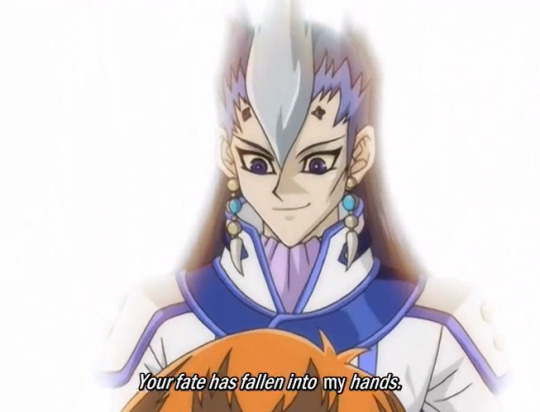
Yu Gi Oh GX and Alchemy: The Albedo
A continuation of my previous post taking a deep dive into the alchemy symbolism in Yu Gi Oh GX. Yu-Gi-Oh Gx Season 2: Society of Light Saga introduces several new ideas at once into the spinoff's storyline. Tarot Symbolism, a battle in the universe between creation and destruction which flips the usual symbolism by making the light / white coded force the light of destruction which is in opposition to the righteous darkness, and the Neo-Spacians to Judai's deck. While these ideas may seem all jumbled they actually connect back to alchemy (and Jung) and continue Judai's arc as an apprentice alchemist.
THE LIGHT OF DESTRUCTION
The main antagonist is Saio Takuma, a host of the Light of Destruction a universal force of destruction that wants to bleach the world white. In case you couldn't pick up on the subtle color symbolism there, the second season corresponds to the second phase of alchemy Albedo, symbolized by water and the color white.
The goal of alchemy is to create eternal life by creating the philosopher's stone which creates a ripple effect affecting the entire world, as above, so below. However, Alchemy is more about the process than the end result, mixing metals together through different stages again and again to purify them, the same way Judai fuses new heroes for different situations in his duels. That process is Black -> White -> Yellow -> Red.
After the nigredo stage where the stone is boiled and putrefied until the solution turns back, in the alcbedo stages is a purification referred to as albutio - the washing away of impurities. This phrase is conerned with "bringing light and clarity to the prima materia (The first Matter). The first matter being the starting material that eventually gets turned into the philosopher's stone.
As mentioned above the antagonist for this season Saio Takuma host to the Light of Destruction takes this step of the process too far by seeking to bleach the planet entirely and wipe out all life. Considering the villain is called The Light of Destruction and the main villainous force is The White Dorm this season is RIFE with color symbolism.
A trend I've noticed for villains in both the first and second stages is that they threaten to trap Judai and the main characters in that stage. In Nigredo, by dueling the Seven Stars in Yami no Games Judai risks being trapped in the darkness. When duelists lose to Saio Takuma or one of his possessed victims, they are purified completely of all individuality and join his cult. Alchemy is a violent process... in order for a union to occur these opposing forces must clash with one another.
“Looke well upon these two Dragons for they are the true principles of the beginning of the Philosophy…. the wingless dragon is sulphur because it never flies away from the fire. The winged serpent is quicksilver… these two must be united.” Their union, however, is “a most violent and bloody copulation.”
Which is why GX chooses to represent these alchemical steps as antagonistic forces, because alchemy requires two opposites to continually clash (chemical wedding fire and water, earth and air etc. etc.), and just like in alchemy in real life you must sometimes clash with someone who's your total opposite in order to more closely understand yourself.
Vs. EDO PHOENIX
Judai starts to drown in these waters of self-reflection after he faces, and loses to the first shadow archetype the anime throws at him Edo Phoenix. We'll cover Edo more later on in this post, but Jung considers the shadow to be the repressed, unseen part of the psyche. Edo represents the shadow of Judai in a lot of ways, most obvious he's the dark-hero to Judai's idealsitic hero. He's the only other hero archetype user in the anime, but unlike Judai's super sentai and ultraman inspired elemental heroes, his Destiny Heroes are all based off of anti-heroes in british pulp fiction (such as Jekyll and Hyde). In fact Destiny Hero Double Dude, clearly based of Jekyll and Hyde is the quickest explanation for the relationship between a man and his shadow.

"With every day, and from both sides of my intelligence, the moral and the intellectual, I thus drew steadily nearer to that truth, by whose partial discovery I have been doomed to such a dreadful shipwreck: that man is not truly one, but truly two.” -Strange Case of Dr. Jekyll and Mr. Hyde
Jung divides personality into a split consciousness model, the persona which is the mask we wear in our everyday life to face the world, and the shadow which consists of everything hidden under the mask that we don't show to the world.
Jung equates each stage of alchemy into different archetypes of the unconscious.
Nigredo - The Shadow
Albedo - Anima and Animus
The Wise old Man
Rubedo - The Self (Indviduation)
A duel with Edo Phoenix for Jason is much like his confrontation with Darkness / Fubuki a deep dive into the Nigredo stage, except this time for Judai the duel is personal because Edo has things to say. He's here to call out Judai Yuki (or Shmaden Shmuki in the dub). Fubuki really wasn't a personal foe for Judai (yes he's Asuka's brother, but Judai didn't know that at the time) he just represented the first time Judai had to duel with stakes on the line instead of just for fun.
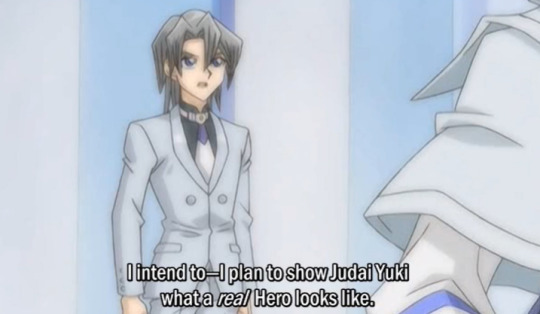
Edo has a few things to say on judai Yuki, someone who so far has been talked about over and over again as having a "pure" heart for dueling. Edo is the first to suggest (and other characters will follow up on this later) that dueling for nothing more than pure enjoyment might not be a good thing. Edo also specifically uses a deck that has been touched by Sartorius's darkness during his first duel with Judai, to further the Nigredo symbolism.
Judai and Edo mirror each other all throughout the first part of the duel. Edo shows that he can create different fusion monsters using the exact same elemental heroes as Judai as material - when he fuses featherman and burst lady he creates destiny hero phoenix guy. There's a bit of symbolism here starting with his name - Edo Phoenix. Phoenixes are traditionally considered the "ying" to the "yang" in chinese alchemy. Destiny Hero Phoenix Guy is made from the same materials as FlameWingman, which features the head of a dragon as one of its arms. Phoenix Guy's effect is that it can't be destroyed in battle by monsters with the same attack - when it clashes with Flame Wingman it can't be destroyed much like it's impossible to destroy the shadow part of your personality.
Edo's callout to Judai is similiarly something that cannot be something that can be ignored or dismissed, it must be reoncicled with.

This is fun to you? Don't make me laugh, Judai! There's nothing fun at all about the fate of heroes who have to fight. The weight of the crosses that heroes bear, the suffering and hatred they endure. Can you even fathom that, Judai? Suffering and hatred? Those are the strengths that support a hero! People like you, who only see heroes as cool or inspirational make me sick. I actually need them - I need real heroes so that I can live!
Once again this callout of Judai's behavior is echoed again and again in season 3 because this show has good foreshadowing - but Edo is specifically calling out Judai's shallowness, Judai admires heroes like a child watching television without acknowledging the hurt and suffering that heroes go through. Edo needs to believe the fact that heroes and justice both exist in order to live, because he's still grieving the loss of his father at a young age and he copes by telling himself he's on a dark hero who will solve his father's unsolved murder and avenge him.
Judai is also similiarly adopting a mask of being a hero in order to cope with a lonely childhood marked by tragedy, it's just he chooses a different mask. Edo pretends to be a dark hero, and Judai a carefree pure-hearted Shonen hero. When confronted with the similarity between himself and Edo, Judai loses the duel and immediately after Nigredo we see Albedo - Judai's cards all dyed white.

THE WASHING OF THE MUD
Albedo is sometimes referred to as the "washing of the mud" the constant process of scrubbing the soul after the soul has been putrefied and its darkest contents brought to the surface in Nigredo.
Altogether, the divine water possessed the power of transformation. It transformed the nigredo into the albedo through the miraculous ‘washing’ (ablutio); it animated inert matter, made the dead to rise again, and therefore possessed the virtue of the baptismal water in the ecclesiastical rite. - C.G. Jung, Alchemical Studies, CW 13, par. 89
Similarly in Yu-Gi-Oh Gx, after a crash course in Nigredo brought to him by his darker half Edo, the dark hero to his pure-hearted shonen boy protagonist - unable to see his cards anymore Judai leaves Duel Academy Island for the sea. Not only is this a direct parallel to Manjoume's journey in Season 1 (losing to a dragon (Misawa's water dragon) -> going to the sea -> washing up on North Academy a tundra that's all ice and rebuilding his deck from scratch.
Each of Judai's friends along with being characters in their own right also represents stages in alchemy, Manjoume who wears black is nigredo and similiarly experiences most character development in season one, Asuka who wears white is albedo and serves as his anima counterpart (more on that later), Misawa and Kenzan both wear yellow for citrinitas and guide him with wisdom (Kenzan is the only one not swayed by Saio's mind control, Misawa appears to Judai when he's lost in the desert dimmension in season 3 as a wiseman).
Manjoume represents Nigredo so of course, Judai parallels him after enduring his own Nigredo stage through his collision with Edo. Of course you might ask if last season was Nigredo then why is Judai going through it again you might ask. Well, Alchemy is a process of continual death and reverse, dissolving and coagulating over and over to refine into a purer material. It's not really a one and done thing. Symbolizing this, the one who hands Judai his defeat that sends him soul searching is Edo Phoenix, once again Phoenixes are important to Alchemy because they too dissolve into ash and die only to be born again.

Saio also draws the death card diagonally, neither upright or reversed to symbolize how Judai is actually going to experience both, he must endure a symbolic death first in order to be reborn. The Death Card isn't so much about permanent death, but rather the death of old ideas that's required for change.
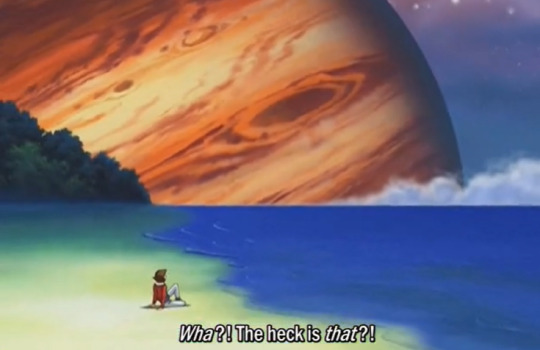
Judai wakes up on a beach after traveling on a boat out to see (similiar to Manjoume), not only does this symbolize the "washing of the mud" referred to above, but water is also the element associated with Albedo. Judai first sees a flaming meteor and when it strikes him he's transported to a beach on an alien planet, Fire (Nigredo) -> Water (Albedo). The first Neo-Spacian Judai encounters is a water attribute monster to, Neo Spacian Aqua Dolphin. In fact, just like the elemental heroes all Neo Spacians are marked by their associated element because they too represent the mixing of elements Judai uses i his deck to perform alchemy. Aqua Dolphin, Air hummingbird, Grand Mole, and Flare Scarab.
When he wakes up on the beach the first thing Judai assumes is that he has died (symbolic death). Then he asks if he's in heaven or hell, only to find he's on an alien planet. There's a special significance to Judai's new "Neo-Spacian" cards being associated with the universe, and "Neos-Space". It's not just that Neos himself is a reference to Ultraman. It all ties back thta fundamental rule of Alchemy: As above, so below.
Quod est superius est sicut quod inferius, et quod inferius est sicut quod est superius. That which is above is like to that which is below, and that which is below is like to that which is above.
Everything in the universe came from one material which divided again and again and differentiated, and therefore everything is connected. The microcosm (the small world, the human being, the miniature universe) is connected to and affects the macrocosm (the great world, the universe as a whole). If everything is connected then the changes you make and the actions you take will inevitably radiate out into the world.

You could say thatlight and dark use our universe as their battlefield. Put a different way, consider it a world where good and evil duel perpetually. The universe was a world of gentle darkness - one which nurtured life. However, this universe is on the verge of ruin by the Light of Destruction. We have searched for someone who is able to fight that light with the power of righteous darkness... and we happened to find you.
In terms of Yu-Gi-Oh GX, the basic worldbuilding and lore is that the universe was first one substance and then it divided into two forces the gentle darkness that nurtured creation and the light of destruction which destroyed. Balance between these two forces must be maintained, but when the light of destruction gains an edge the Neo-Spacians appeared before Judai to call him to protect Neos-Space with the power of the gentle darkness.
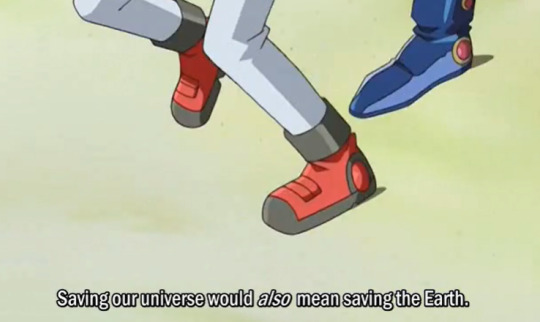
In other words, Judai facing Saio on earth (the small world) will radiate out and prevent the destruction of Neos space in this battle between universal forces (the great world). Judai saves the universe by playing card games, it sounds silly but symbolically it just means that once again that you're connected to the world around you moreso than you realize and your actions will inevitably have a ripple effect and effect the world and people around you. Judai symbolically saves theuniverse by beating Saiou in a duel, but in the world of human beings his actions save both Saiou and Edo's friendship.
In GX worldbuilding terms as well, Neos-Space is an alternate dimmension one of twelve inhabited by duel spirits who are real, sentient creatures who's powers are called upon with the magical cards. When Judai saves his world, he also saves Neos Space because their two worlds are connected.
A lot of shows have "the fight between the forces of light and darkness never end" but GX reframes the never-ending fight as the process of alchemical refinement. It also flips the traidtional light and dark associated symbolism so light represents destruction and Judai needs to tap into the power of darkness in order to fight it.
Furthermore, Judai harnessing his iner darkness is Jungian symbolism. As stated above, Jung divided personality into perona, shadow and the further into anima and animus. A person goes through the process of individuation in order to grow up into a well-rounded human being, and this process requires incorporating all the different parts of your personality into your ego. The pure-hearted Judai however, has a dark shadow and we'll learn in season 3 part of that shadow consists of the memories of Yubel he repressed when he abandoned Yubel. However, because Yu Gi Oh GX is a series with bad pacing but excellent foreshadowing - Judai flashes back to his childhood when he notices something is missing and he can't remember the reason why he's been dueling.
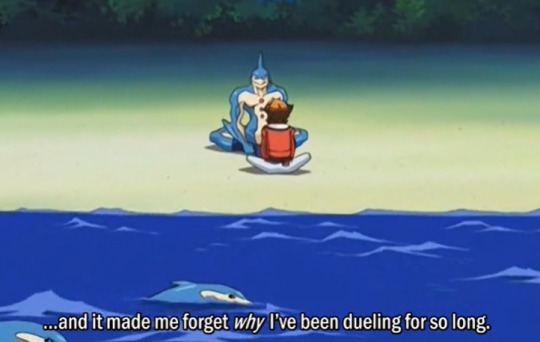
Why else would Edo's challenge to Judai disturb him so much if there wasn't something missing, something he's not quite remembering about the reason he started dueling something hidden in darkness.
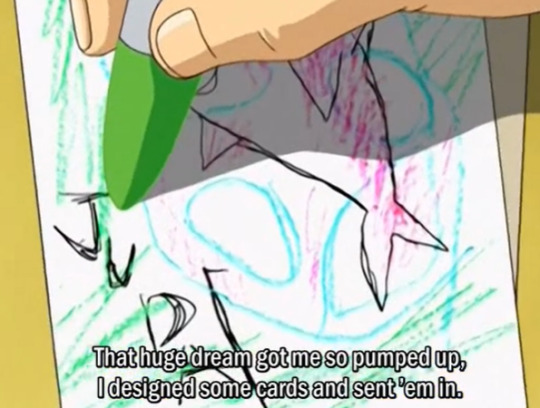

The origin story we eventually get for Judai in season 3 is actually give to us slowly over time in three parts - because Judai himself takes that log to remember it due to his repressed memories. In season 1 he remembers that at one point he was able to hear the voices and card spirits when he was younger, but somehow lost that ability for a long time until he met winged Kuriboh. In season 2 - Judai remembers the Kaiba Corp contest that launched a satellite into space where his drawings of Neos and the Neos Spacian were eventually infused with the power of darkness. By recalling his memories and remembering that part of his childhood he gains the powers of the Neo-Spacians (having done the work of exploring his shadows).
However, Judai's origin story is only 2/3rds complete and the last missing piece will come with Yubel's introduction in season 3 who serves as Judai's literal shadow.
Judai doesn't completely integrate his shadow here, but once again alchemy is a process, so he'll have to do more work later. However, he's confronted his shadow enough to make the difference during his rematch with Edo.
VS ED - A NEW POWER! AQUA NEOS
I'm skipping Manjoume's duel with Saio, because I'm putting all the tarot stuff in another post. Which gives us more time to talk about Edo, Edo's flashback shows his first meeting with Saio in the rain. Saio the leader of the white dorm, white, rain/water, all symbols of Albedo.
Edo also represents Albedo, he dresses in a silver grey / white suit, his hair is similarly silver and gets bleached white at one point, his closest connection to any character is to Saio, his defeat of Judai starts the alchemy process for Judai, and his defeat of Kaiser Ryo sends him spiraling into reverse alchemy (more of that later).
Now back to Judai - before facing Edo he has to claim the rest of the Neos Spacians from the elemental plains where they reside, such as going to a magma pit to claim flare scarab. Fire, wind, water, earth, elements, alchemy....(kronk voice) it's all coming together.

Anyway, Judai worries all of his friends by telling them about how he was abducted by space aliens and the duel begins. This time Edo is the one who loses and it all has to do with the work Judai has done confronting his past which Edo has not. The biggest foiling point between the two of them is that Edo and Judai's hero worship comes from their inner child. Their desire to be a hero is childish and immature, as neither really knows what being a hero is yet, but also pure.

Aster: Judai, are you... that happy to be showing off your heroes? Still, I won't stand for any heroes unburdened by destiny! Judai: Listen... What happened to your dad was really sad. But... doesn't it just pump you up to meet some new heroes? You would know, wouldn't you? I bet your dad did - he must've made your D heroes so that seeing them would make you feel happy, not sad!
It's a collision of opposites once again, Judai looks too much into the light but here Edo's been stewing in his own dark feelings of mourning his father, and a desire for revenge for so long he's forgotten happy memories of his father.
Edo's not wrong that heroes have to carry burdens, it's more foreshadowing for lessons that Judai has to learn in Season 3 but there's a difference between carrying your burdens and drowning because of them. Later on in the Saio portion of the fight it's shown that Edo's time has stopped completely just like his signature card the clocktower, Edo is still a child, the same way Judai is still a child.
Edo who isn't aware of that yet loses to Judai who's at least recovered some memories of his childhood. In this instance Judai is the catalyst which makes Edo change.
Of course Judai's arc pretty much stops here, as I said Judai's characterized by stagnation through the first two series. That's not to say he doesn't change at all, in Season 1 we get the speech where Daitokuji asks him what he's gained over a year and Judai says he's gained friends. Not only does he have friends, but it's the season where he first takes up the burden of dueling with his life on the line to save other people so he can protect those friendships. Which seems like standard shonen fair but is deconstructed in season 3.
Season 2 is where Judai is first seriously questioned on his lack of reason for fighting, and his lack of any burdens. While Judai doesn't really change because of this question, his lack of change is indicative of something missing in him.
Arguably, a lot of problematic behaviors of Judai's in Season 3 start in Season 2, they're just not immediately called attention to. We'll talk about them now in the White Arc.
The White Dorm
Alchemy is heavily associated with color symbolism, Albedo is symbolized with the color white so of course one of the main antagonistic forces this season is the white dorm.
I'll touch more on Manjoume's role as the main head of the cult for most of the season in my upcoming tarot post, but Judai's friends being integrated into the white dorm means they are experiencing Albedo right alongside of him. However, in this case they experience a dissolution. Each of his friends dissolves entirely and experiences a death of personality, making them puppets for Saio / The Light.
In each duel, Manjoume, Bastion and Misawa the Light preys upon one flaw in their personality. For Manjoume it's his inferiority complex and his desire to beat Judai (a rivalry he takes much more seriously than Judai), for Asuka it's her emotions that people are constantly telling her to calm down so she can conform into a more feminine role, for Misawa it's the fact everyone in the school just decided to start ignoring him after they found out he was a furry.
(On a more serious note a lot of people think the show dropped Misawa's arc entirely, but I'd argue there is a three season arc there and that it mirrors Judai's. In season 1 Misawa is an obsessive perfectionist duelist considered one of the two rivals to Judai, and like many students there doesn't think of much of his future but becoming a pro duelist. However, the encounter with Tanya shakes him by waking him up to a desire for love in his life and Tanya disapepars. In season 2, Misawa's failed to live up to his potential as one of the higher ranking duelists in the show and kind of washes out like Hell Kaiser Ryo did when he figures out he wasn't as great as everyone at the school told him he was. Saio compounds on this by ignoring him, which on top of his friends all deciding to ignore him makes him vulnerable to being recruited to a cult. Misawa's the only one who joins willingly if you think about it, which shows how unloved he feels in season 2.)
Aster's speech on the matter is revealing in regards to the loneliness Misawa feels.
Misawa doesn't actually want to get better - he just wants those around him to see him as being good. Being a true duelist is lonesome. Even without attention from others, they'd just follow their own path with faith in their deck and tactics. Results and praise just come after the fact, but Misawa is different. All that lies deep in his heart is an idiotic elitist desire for the ability to be noticed by others. It worries you does it not? It pains you does it not? That others will not acknowledge you. In the end he'll lose faith in himself. Something like that can't become a true duelist.
There is a reason for this brief tangent with Misawa in the Judai's friends section, in that the friend group's collective decision to ignore Misawa probably because they assumed he was an elite duelist who could take care of himself shows that their friendship is not as strong as it seems.
The cracks are already starting to show in Season 2. Not only does everyone collectively neglect Misawa, but Judai as a whole lets each of his friends be taken by the light, and he's either not around or doesn't lift a finger to stop it. Asuka and Manjoume spend weeks being brainwashed and Judai feels no urgency to reach out to them and fix it. This is even something commented upon by Judai himself when he finally goes to face Manjoume.
What this means in alchemy terms is that these bonds are broken, and reforged by necessity in order to be forged into healthier friendships. Judai's friends experience a dissolution in season 2, and Season 3, before he's able to forge a much stronger connection in Season 4.
Judai's friends who are dyed white also each represent a personal flaw of Judai's that he needs to be cleansed of. For Manjoume, it's Manjoume's general stagnation which Judai reflects because Judai is a stagnant character for the first two seasons. Part of the reason Judai is stagnant is because of the codependent friendships he forms with others, Judai and Manjoume are characters who both struggle to stand on their own two feet.
As mentioned above, Judai is also someone who tends to have his emotional needs neglected by others the same way Misawa was because everyone assumes Judai can take care of himself.
THE WHITE QUEEN
The last and probably most important is Asuka who I've mentioned in my last post is an anima, or a female Judai. Now, I'll elaborate on that point.
The Anima and Animus are what Jung terms "Sygzy" a term used y Jung to mean the union of opposites. Similiar to the Taijitu or Yin and Yang symbol. The feminine Yin and Masculine Yang each tcontain a taenite, a dot that represents the yin (feminine) within the yang (masculine) and vice versa.
What it means essentially is that every single person is a collection of what we traditionally consider "masucline" and "feminine" traits. Of course those definitions depend on culture, but gender is like money. Yes, Gender is completely made up, but I can say things are masculine and feminine and you'll know what that means the same way that money is made up but I have to pay five dollars for my boba tea.
Of course Gender isn't split down a male / female dynamic either but this is really old psychological framework we're working with.
Even Jung however as old was onto something when he observed that the way men are socialized especially growing up (with gender roles being as rigid as they are) leads to them having underdeveloped or even suppressed feminine traits.
Jung believed a male’s sensitivity is often lesser or repressed, and therefore considered the anima (the unconscious feminine side) to be one of their strongest sides. Ergo, men are more likely to repress their feminine sides, and at the same time the only way to develop those sides is to seek out femininity and interact with it. That sounds like basic rules of human interactions, the only way you can learn to have healthy relationships to other people and how to show your emotions in healthy ways is by interacting with people.
Which is where the chemical wedding comes in. The Sygzy is the union of opposites fanima and animus) formed by a chemical wedding between the two.
Men usually progress through four stages when it comes to integrating their anima (in other words they mature in the way they perceive and relate to the women in their life). These are represented by four archetypes, reoccurring characters and symbols in fiction. Jung believed the reasons archetypes kept showing up in different stories is because they symolized something deep within our own subconscious.
These four archetypes are:
Eve (mother)
Helen (romantic interest)
Mary (religious devotion)
Sophia (wisdom, guide to inner life).
Asuka serves as Judai's anima for the first two seasons, and vice versa, but I'd argue they never pass the first two stages.
My reasons for arguing this is number one, Judai and Asuka only have two duels against each other in season one and two. Number two, Jung marks Albedo as the stage of integrating your Anima. Asuka wears primarily white, she's basically female Judai sharing his love of card games, and their final duel happens in season 2.
Judai doesn't view Asuka as amother figure per se, but when he first meets her he is a child as their first duel takes place in the third episode. So she is someone who 1) nurtured his growth, and 2) could have been a possible romantic interest for the first two seasons.
I think Judai and Asuka's two duels however are an example of a chemical wedding that turns out to be non-romantic. As Asuka is basically replaced as Judai's potential love interest by Yubel or arguably Johan too. Also the fact that they are basically set up to be love interests only to have that set up subverted is the point here.
The strongest connection between Judai and Asuka, and the reason they serve as each other's anima and animus for a time is thatthey both don't really fit into the roles society assigns them. Especially their gender roles, Judai is a subversion of the hot-blooded shonen boy protagonist and Asuka a subversion of the female lead character always being the love interest.
As stated in my previous meta, Asuka is very like Judai in the fact that her first love is dueling. Therefore she doesn't fit into the mould of what a lot of people consider to be feminine, despite being the 'queen' of obelisk blue. This post goes into a lot more detail on the relationship between Asuka and Gender.
Asuka seems to be written as a response, or maybe even a correction of Anzu Mazaki from the first anime. A character who while important, suffered from what many consider to be female shonen character syndrome they mainly exist to be an emotional support to the protagonist and lack flaws / ambitions of their own. I guess the english word for it would be chickification.
Here let me cite the scholarly resource known as Tvtropes:
You have an Action Girl, who may also be One of the Boys. She rocks. But she's probably the only female in the main cast, or at very least, the most openly tomboyish in the female cast. And it doesn't seem to be playing well with the 18-35 male demographic. So the writers, either on their own or because of Executive Meddling, soften her tough edge. Gradually, the Action Girl starts seeing significantly less action. She exchanges her armor for outfits that show off her figure. Her plotlines become increasingly centered around romance, dating, and fears that she isn't married yet. She gets easily turned into a Damsel in Distress by the same villains she would have handily thwarted previously just so the male characters can save her. The character who was once comfortable and competent has been Chickified. This is about maturity being equated with passivity, with "girls/women can't", rather than just learning to make wise choices or cope with challenges.
To simplify, the predominant trend in Shonen manga is that men are allowed to be active characters with agency, and female characters are always reduced in agency and independence, usually defined by their relationship to a male character to the point where femininity goes hand in hand with passivity.
The main problem with this is it doesn't allow female characters to have thoughts and feelings of their own, outside of either the roles they play to the men in their lives, or just them being reduced to their gender, in the friend group they're just "the chick." A lot of manga authors even admit to throwing in female characters just to have a female character without really thinking of their role in the story.
Asuka is a deconstruciton of both the way female characters are treated in this gnre, and also she as a girl has to deal with the expectations to perform femininity from everyone around her.
Asuka is feminine, she's considered the "pride of the Blue Girls", at the beginning of the show she's well-respected, popular with the girls and also incredibly detached and bored. She basically extorts a duel out of Judai just to find a challenge. It's easy to see where this dissatisfaction comes from, not only is duel academy weird about women, a lot of the men Asuka is forced to interact with reduce her to her gender.
A common Asuka filler / solo episode usually follows this formula, "A man with a crush on Asuka challenges her to a duel with a condition that she'll date him or is otherwise trying to coerce her into doing something else she's uncomfortable with."
A nice subversion to this formula is early on in the dub where Judai and Tennis Guy compete to be Asuka's "fiance" only for him not to know what that even means, and Asuka to just say it means "friend."
Which just might be what makes Judai so unique to the point where Asuka starts to consider him a romantic possibility, because he is the one exception, the person who only ever regarded her as a duelist first and a girl second. As Asuka is feminine, but she exists in a world where she's not allowed to be feminine and still retain her activity and agency at the same time.
Manjoume and his two duels against Asuka could be seen as a metaphor for the way the world, and especially boys in Asuka's life impose femininity on her and expect her to conform to gender roles / their gendered expectations of her. Manjoume duels her twice, both duels resemble chemical weddings of a sort with the goal of getting Asuka to accept his feelings towards her.
When he beats her in the second duel look what Asuka's basically reduced two, the queen at his side, the second in command of the white dorm, and most of all, the elegant, refined, cold-hearted girl. She has ceded all agency due to the fact she's being mind controlled, she's also lost all of her emotions to the point where everyone describes her as being "like ice" in order to conform to a role given to her by a man.
When Judai and Asuka duel a second time, it is another chemical wedding, and one necessary for Asuka's development as a character but it's decidedly non-romantic. It's also a re-creation of this Splendor Solaris plate, a meeting of the solar king and lunar queen.
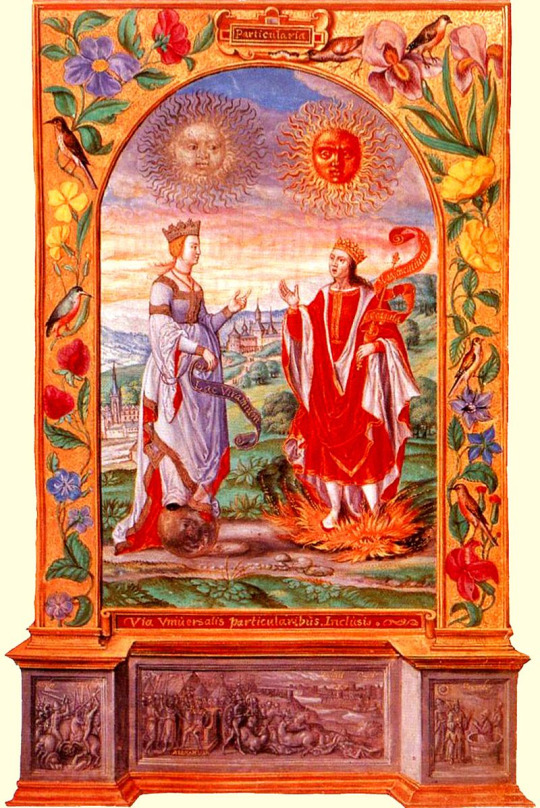
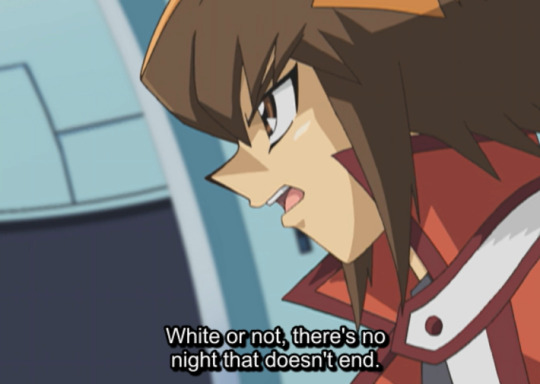
Judai: The sun will rise high in the sky! So open your eyes already! Asuka: Impossible, right now I am my true self. There's no need for me to awake. Judai: Then, I'll have to force you awake. I attack White Night Dragon with Flare, Neos. Let everyone's fiery feelings reach her! Melt it! Melt Asuka's frozen heart! Burn it to ash!
The episodes are called "A White Night Duel" associating Asuka the queen of the obelisk dorm with night time, and the moon. The first duel with Judai and Asuka took place in the moonlight as well, and it took place on water.
The duel also marks them as a pair of elemental opposites. Asuka's brother Fubuki uses snow character in his name. Asuka's swapped out her cyberladies deck for an all-ice deck.
Judai's commonly associated with the sun. Before this Fubuki stated that Judai was riling her up and igniting her flaming spirit. His winning the duel is using Flare Neos a fire attribute monster to defeat the "White Night Dragon".
So Asuka's in a state where she's finally been forced to conform to everyone's expectations as a girl, and given up the struggle of trying to be herself and as a result all of her emotions have shut down. Judai manages to excite those feelings inside of her once again by reaching out to her, not as a love interest might (this duel is way, way different from the way he tries to save Johan from Yubel's possession) but as a duel rival would by trying to reignite their rivalry.
Judai doesn't even say that it's his burning feelings that reach her, but rather everyone's. Manjoume and Fubuki try to reach out to Asuka in the duel by giving Judai cards to play, as a love interest, and a brother, but they both also have trouble seeing Asuka for who she really is from time to time which is why their cards don't work. Judai reaches her because he's not trying to be a love interest in this duel, or anything other than a friend.
This duel I believe solidifies what they are to each other, which is why Judai integrates Asuka as part of his anima and they have no further duels after this.
As to what Asuka exactly provides to Judai after going on this long rant about how Judai and Asuka's friendship is unique - well, Judai doesn't really conform to gender roles either.
If Asuka is the typical girl in Shonen Manga given more depths, and burdened by the expectations everyone holds towards girls around her, Judai too suffers from those expectations. The manga reaches a point where Judai is just expected to be the pure-hearted shonen hero who tackles everyone's problems.
Judai isn't allowed to be vulnerable or feminine because a lot of masculine roles get pushed onto him, he has to be Sho and Kenzan's big brother, he has to be the protector of everyone, he has to be the leader because he's the best duelist. In late season 3 he's forced into the role of being king by Yubel's manipulations.
On top of that there's the subtext that Judai doesn't conform to heterosexual and cisgendered norms, like is two other possible love interests are Johan a dude, and Yubel a nobinary dragon. His Jungian shadow is also yubel, a nonbinary dragon so what does that exactly say in regards to Judai and his own gender.
Asuka even builds up one sided feelings towards Judai that could be seen as the typical shonen main character guy and girl relationship that happens in almost every manga - except Asuka lets go of those eventually, because in letting go of that she gives Judai what he really needs a friend.
Asuka and Judai's friendship is important because they both don't fit in with what everyone else expects them to do, and want to be seen for their skills as duelists first before their gender. That's what they give each other through their chemical wedding and having gained and solified Asuka's friendship, Judai integrates his anime and moves to the next step of alchemical refinement.
HELL KAISER RYO / NIHILIXIR
So I'm going to address Hell Kaiser in one go, because I love him and also he represents an example of reverse alchemy or the nihilixir. Usually death and rebirth is a good thing and necessary for alcemical refinement, but sometimes instead the process makes you degrade into something impure, descending into baser instincts.
The transformation Hell Kaiser undergoes in season 2 and onwards is an example of something which resembles alchemy (for instance you could say his descent to the underground dueling arena, and his climb back to the pro leagues resmebles the drowning king where the king simultaneously drowns and rises) however instead of the death and rebirth leading to a more refined version of himself he just gets worse.
The catalyst for this arc is of course Edo Phoenix, but also a very true to life problem of a kid who's always been told he was going to be number one, going out into the world and finding out he's a small fish in a big pond. I'm going to steal Kate's post here because she's my Daitokuji-sensei. Here they use Salem from RWBY as an example of reverse alchemy, mainly the inability of an immortal character to grieve and accept death means they cannot move forward and instead move backwards and experience nothing but negative character development.
It's not just that Hell Kaiser lost to Edo Phoenix (a symbol of death and rebirth), it's that he can't accept the loss specifically because he's been told all of his life he's a winner. Hell Kaiser is such a perfectionist (he even told Judai that he thought his perfectionist tendencies held him back from true growth whereas Judai represented limitless potential) that he cannot accept or cope with the fact that he lost. He can't see that he might not have been as good as everyone always told him he was, and he starts to spiral.
So Hell Kaiser experiences a journey where he descends to the underworld (underground duels) and comes back, hence the name Hell Kaiser because he's been to hell and back but he doesn't change as a result of that journey. It's a false rebirth, rather than becoming something new he just doubled down on who he was before.
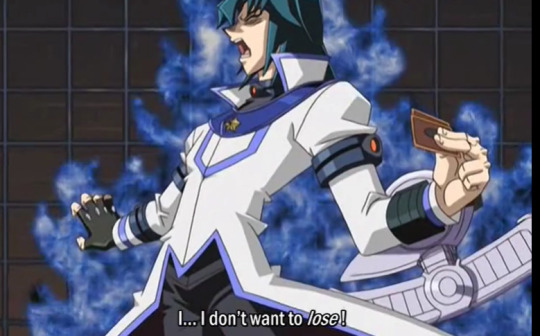
I don't care how, but I want to win and defeat you. I get it now, I finally do. I've lied to myself ever since my match with Ed... I duel by respecting my opponent. I thought winning or losing wouldn't matter if I did that, but I was wrong. I thirst for it - for victory! ANd if I have to steal victory from your hands, I will!
Hell Kaiser's original philosophy is a "respectful duel" which is just a duel where you try to understand your opponent and what they're thinking. However, after his duel with Edo his perfectionist tendencies win out against his desire to understand his opponents and he becomes obsessed with victory.
If Salem goes in alchemy in reverse because she won't accept grief, Ryo goes through reverse alchemy because he won't accept the prospect of losing or that he might be wrong. Alchemy is also primarily about changing into a new substance, a person who won't admit they're wrong and doubles down can't change.

Ryo goes one step back in alchemy by changing his outfit from white (albedo) to black (nigredo). Everyone treats this as a big change / rebirth from him, but in their duels against him Fubuki his rival, and Sho his brother both say the opposite.
Fubuki calls upon the darkness to try to match Hell Kaiser's deck with his red eyes deck, believing that Kaiser must be lost in darkness or otherwise be possessed to be acting the way he is.

Only to have it confirmed twice this isn't the case, Ryo hasn't changed. He's stayed the same person he was at season one and his so called dark turn is actually character regression because he refuses to adapt to new circumstances. Even the way he's depicted in fire is once again, a reference to nigredo because he's taking one step back while everyone else is in the albedo stage.
Of course being obsessed with winning seems like it's not the worst thing in the world, until Ryo's obsession with chasing the thrill of victory leads to him not only nearly killing his little brother with the same electrodes he was shocked with in the underground arena (remember in season one where he lost a duel on purpose to camula to protect Sho's soul) and then in season 3 developing a heart condition because he kept using the electrodes during underground duels.
Ryo also descends into death by embracing the cyberdarks deck, a deck which primarily uses graveyard effects to make his monsters stronger. Nihilixir comes from resisting change, loss, grief all of these things which are inherent to life, and therefore leading to stagnation and death.
I spent so long on this section because one - this is GX's primary example of negative character development, but also because this too mirrors eventual growth Judai will have in season 3. Ryo is a foil and rival to Judai, and there will reach a point where Judai too much like Ryo rejects grief, and doubles down on power, becoming obsessed with victory. Judai goes through some major character regression before he can grow again.
EDO PHOENIX
This post, much like GX Season 2 has put off Edo's character development for long enough. Judai and Edo for all of their differences have one thing in common that they're both trapped in their childhood.
They are both lonely children who leaned on stories of heroes in order to comfort them. Edo believes in dark heroes that would avenge the death of his father, Judai believes in heroes who save others. They both play hero to cope, Edo plays a hero on a quest of revenge, and Judai plays hero to all of his friends, taking on their burdens as his own.
If anything a lot of cracks in Judai's behavior show in season 2 and become a problem in season 3 because he failed to address or fix them. Neglecting his friends his friends until they all get brainwashed and become victims of the main villain? Happens again in season 3. Judai being told he can't keep dueling for fun and will have to eventually accept responsibility? Happens in season 3. Judai realizing being a hero means carrying brudens that might crush you? Happens in season 3.
Saio is kind of a silly villain, he's possessed by evil space rays that made him try to use a satellite to destroy the earth. However, symbolically with the light of destruction as a force of too much light that wants to wipe out the dark I think the season achieve a lot in Jungian terms. There's an entire monologue in the Manjoume vs Judai duel episodes about how the light of destruction wants to banish all shadows, which is evil, and blocks the light.
Calmly close in your eyes a pure-white sun shining in the sky as it iluminates a flat-pure white land. Let us assume that something now sticks out on the land. It creates an evil - darkness. Which is evil and blocks out the light. We must take all those who bring forth the darkness... and eliminate them until they are no more!
This and many monologues from the white dorm / saiou hint that maybe, purity.... is a little bit bad. Alchemy is a process of balance by two opposing forces meeting in a chemical reaction, but the light just wants to bleach everything.
This season if anything sets up the idea that purity isn't that great... after all the light monologues about wanting to wipe out shadow, but it's impossible to get rid of your shadow in a Jungian sense.
So we have the start of the purity = bad symbolism, right next to Judai who is a character who's still constantly being lauded for his "purity" his "pure childlike heart" and so on and so forth.
Now is Judai pure because he's confronted the darkness, and come out on the other side of it, or is he pure because he's just... not even looking at or acknowledging the dark. After all Judai's shadow isn't here, Judai's shadow is Yubel and Yubel doesn't turn up until season 3.
Yu-Gi-Oh GX season 2 is paced badly, but there's also something to be said about the way it's structured. Judai basically remains a passive character all throughout, the only time he journeyed to find something is when his cards were bleached white. Judai only ever responds. Judai's friends are kidnapped and he goes to save them.
There's a scene where Judai is sitting in his room with Kenzan and Sho, and then someone walks in and says "Judai, I need you to save the world, someone is going to use a death ray satellite in order to wipe out humanity." And Judai's response is appropriately: "What?"
Which once again, bad pacing because the main character is almost entirely uninvolved in the conflict, but it also sets up the idea that Judai is once again the designated hero. Does he seek out and try to solve problems, or does he just end up getting problems dumped into his lap?
Of course this parallels him with Edo, someone who not only wants to be a hero (to the point where he dresses up and beats up thieves), sees himself as a person on a heoric quest for revenge, but is obsessed with the concept of Destiny and the idea that he must be a special, chosen hero.
The plot takes these two characters, one who is actively trying to be a hero, and one who is just forced by circustmances and his friends into the role of hero and then suggests they are the same.
The introduction of the DD episodes, and the duel against DD and Bloo-D establish that Edo's quest for revenge was pointless from the beginning. The person who killed his father has always been - right next to him, watching him flail around in the dark.

Believe in your D-Heroes power over the future all you want, but the time within you has been paused this entire time. From the moment your father died... you haven't changed at all - you haven't grown up at all. You're the same kid you were back then.
If Edo, the proffesional duelist, who puts on all these airs about maturity and constantly lambasts Judai for not understanding the sacrifices that heros make, the burdens they care and the responsibilities they have is just a child - then what does that say about Judai?
Edo Phoenix, the character that's supposed to represent the phoenix, death and rebirth is a character that's been stagnant all along just like Judai. Death is a part of alchemy, but as I went to great lengths to establish with Ryo's section, in alchemy stagnancy is DEATH.
DD possessed and corrupted by the light, spouts words that are eerily similiar to what Edo says.
Self-interest? Not quite. I wanted to know ehther or not I was the chosen one. Just look at history - all the greats who seized power would always commits some number of crimes. In killing your father, I became great myself - and I proved my status as a chosen one.
DD rants about being a chosen one, but what does being a chosen one mean? He's possessed by the light who saps him of all free will just like Saiou. Season 2 constantly talks about destiny and destined heroes, and for the longest time I thought it was just speaking lipservice. That typical "We the heroes can change destiny if we just believe enough" until I remembered my favorite Jung quote.
“Until you make the unconscious conscious, it will rule your life and you will call it Fate.” CG JUNG
Edo's obsession with destiny comes from not wanting to confront his past and his inner wounded child. If he believes he's a chosen hero on a quest for revenge, he doesn't have to confront what DD pointed out that he's still the grieving child who lost his father.
Since Edo ignores the unconscious, he is for most of the story a pawn in some way or another. He's a pawn to Saio believing and following his prophecies, he's a pawn to DD who killed his father never once suspecting him. The other characters who refuse to make the unconscious conscious become pawns of fate as well.
DD becomes split seeing himself in the mirror, before the voice of the Bloo-D card whispers to him and controls him. Saio becomes split as well between the version of himself Edo grew up with, and the one completely possessed by the avatar of destruction. Saio makes a case for being helpless to destiny since he was just possessed by evil space rays, but even Saio admits while ranting that he always hated the fact that people shunned him for having supernatural powers.
So purity = bad. Not acknowledging your shadow = being controlled by fate.
Then we have our willfully ignorant hero Judai who shows up to save the day as always.
Edo is the one who's actually gone through the process of alchemy and change in order to face this duel against Saio. Edo confronted DD, on a boat which burst into flames (fire) on top of the ocean (water). He basically speedran through Nigredo. He even killed his father in order to move forward through time again.
Edo also having gotten his revenge in the most empty way possible (not only does he find out his adoptive father was using him all along, and that his quest for revenge was pointless because the culrpit was right next to him, but also he has to kill his father's soul trapped in the card in order to win the duel) has no realized that his desire isn't to get revenge or even to defeat evil but to save Saio.
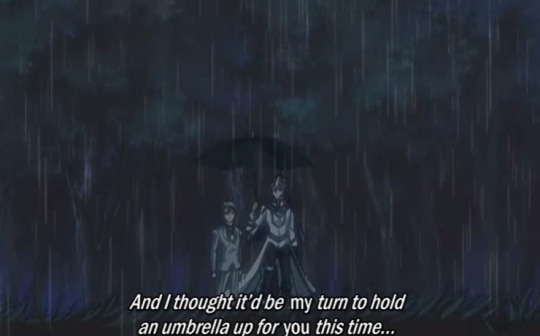
I'm sorry, Ed... I didn't mean to drag you into this. What are you talking about? You're my friend aren't you. [...] It's not fate I'm believing in. It's you, Saiou!"
He realizes this while finding Saiou's soul trapped in a recreation of their memories where they first met, when Saiou offered him an umbrella under the rain. Rain = water = albedo and Saio is wearing white, alright I'll stop now. The rain also scrubs clean his soul as Saio lets go of anger, and frustration and revenge ideas he had tied up into his dark intrepretation of heroism and focus on a friend.
My point is in order to duel against the light of destruction and try to reclaim Saiuo's soul, Edo gives up the satellite key and puts the world at risk in order to save one friend.
Edo Phoenix has finally experienced a death (the death of his father and adoptive father in flames, and the death of his original purpose of revenge) and rebirth. His new purpose becomes not to be the hero, but to hold out the umbrella and shelter Saiou from the rain the same way Saiou did in the past.
He also puts emphasis on his desire to connect with Saiou, and that being more important than any destiny or fate. Edo is trying to connect and collide with others again, and is finally starting to grow and change.
When Judai steps in he has practically no emotional investment, besides you know, not wanting Edo to die, and not wanting the world to get destroyed by a death laser because he lives there. Edo abandons the idea of being a hero, lets that dissolve and does something genuinely heroic in saving a person. Judai plays the hero again, but because he has no personal connection to Saio, practically everything he says about friendship, allies and fate is lipservice.
Edo is propelled by circumstances he thinks are fate the entire time when it's really just him failing to make conscious of the unconscious. However, he confronts his darkest self and then gains the ability to choose - and then confronts Saio by choice. Judai is still being thrust into the position of hero by destiny by the end of Season 2.
Judai ends season 2 not having changed. Since stagnation is death in any alchemy themed show, the show does not frame this as a good thing. Saio uses his ability to show Judai his future in episode 103 in an effort to intimidate him into giving up hope and accepting destiny.
After all this you still try to defy my wheel of fortune? In that case, I shall use my ability of foresight. You shall wallow in despair, and detest your own fate.


Saio not only shows Judai a preview of what will happen in Season 3 when Duel Academy gets teleported to another dimmension, he gets confronted with... bum, bum, bum HIS SHADOW!
Everyone say hi to Yubel!
A horrifying vision which Judai responds to with more lip-service. "I think our fates can be changed!" That's typically what the hero says in this situation.
However, you could also see this as another instance of Judai being forced to look at his shadow, only to choose to look away again. Because he looks away and fails to make the unconscious, conscious, everything that Saio and this vision predicts more or less comes to pass.
So Saio screams a lot about destruction, how inevitably everything will be destroyed in this duel, and it seems like generic doomsday villain stuff but it's right. Destruction is inevitable. Judai has a similair vision to the one Saio showed him in season two, at the beginning of season three of all of his friends dissolving into sand, a symbol of dissolution and that vision comes to pass too.
Death, and destruction are part of life, and alchemy is a process of accepting these things in order to dissolve and be reborn into something stronger.
Solve et Coagula (dissolve and coagulate) except Judai through two seasons, doesn't dissolve, and therefore doesn't come together and change into something stronger.
Judai is like peter pan a boy without his shadow, and without the ability to integrate his shadow he can't grow up. Which leads directly into all of his difficulty into season 3. Judai has a pure heart, but how does a pure heart that's never been dirtied (nigredo) and then scrubbed clean (albedo) know how to handle it when it starts to loser its purity? What about all of Judai's friends who value him for his purity and never look at his flaws, how can they cope with that fact when he starts those how those flaws?
As I said Ryo has a lot to do with Judai's season 3 arc by demonstrating the dangers of resisting change. Ryo becames unable to accept any loss and needs to always win. What happens when the invincible main character of the story Judai, the invincible ero starts to lose and doesn't know how to cope with the loss?
I'm sure he'll handle it much better than Ryo did. (I'm just kidding, he doesn't.)
Anyway, to the five Yu Gi Oh fans who read all this look forward to the second part of this post where I describe tarot symbolism.
18 notes
·
View notes
Text

This is how that went right
27 notes
·
View notes
Text












Duel Links: Saio (Prophetic) Basic Sprites
25 notes
·
View notes
Photo

Had folks on twitter throw GX characters at me to draw and now I present to you this Very Good charcuterie board of guys
#yugioh gx#chazz princeton#jun manjoume#syrus truesdale#sho marufuji#zane truesdale#ryo marufuji#jim crocodile cook#jim cook gx#bob banter#tsugio kanda#bastion misawa#daichi misawa#jesse anderson#johan andersen#vellian crowler#dr crowler gx#chronos de midici#sartorius kumar#takuma saio#ygo gx#ygo#OK I THINK THATS EVERYONE??!?!#ygoart#dana art#ironically despite the tweet i think the sartorius is my fav. really scrombled him a little
183 notes
·
View notes
Text
yugioh gx 101

YOOOO HE'S DOING THE THING




I like this conversation. It's good*

it's always cool when stuff like this happens

I love stuff like this*

AWWWW YEAH
...
I feel like you could've given him a win here but let's see what happens...
3 notes
·
View notes
Text
When the villain is spouting relevant shit:

#yugioh#yugioh gx#ygo#ygo gx#takuma saio#takuma saiou#season 2 is really good guys#I'm watching the final episodes right now#I'll probably post an overview of the season later tonight
16 notes
·
View notes
Photo

Your fave is a fictive: Takuma Saio from Yu-Gi-Oh: GX
(request by anon)
[ Image ID: a pastel horizontal striped flag ranging from green to pink from top to bottom with a picture of Takuma Saio from Yu-Gi-Oh: GX imposed over it /end ID ]
#your fave#your fave is#your fave is a fictive#fictive#pluralgang#plurality#takuma saio#yu gi oh#ygo#yu gi oh gx#ygo gx#request#anonymous#mod EPOCH
5 notes
·
View notes